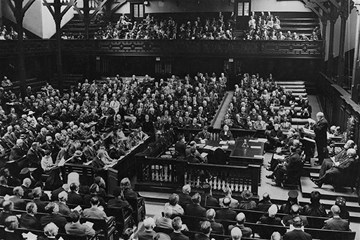In 2018 we celebrate the 70th anniversary of the World Council of Churches. In order to create a lively firsthand account of the ecumenical fellowship and of our shared journey, member churches have contributed stories of people, events, achievements and even failures, all of which have deepened our collective search for Christian unity.
The World Council of Churches is an ecumenical partner supported by the Interdenominational Cooperation Fund apportionment, which enables United Methodists to share a presence and a voice in the activities of several national and worldwide ecumenical organizations.
The Religious Society of Friends (Quakers) in Canada was very much involved in the strong ecumenical currents that began in the latter part of the 19th century and gathered strength in many parts of the western world throughout the early decades of the 20th century.
Delegations were sent from Canada to the World Missionary Conferences, including the conference held in Edinburgh in 1910 to which many attribute the beginnings of an ecumenical movement
In 1921, Quakers in Canada appointed several people to be in touch with churches in Canada to organize some form of peace association. These proceedings eventually resulted in the organization of a branch of the World Alliance for International Friendship and the participation with other churches in several inter-church associations including the Fellowship of Reconciliation and the League of Nations Society.
In 1937 two ecumenical conferences were formed, one on Life and Work in Oxford and one on Faith and Order in Edinburgh. The desire to bring together these two, often conflicting approaches to faith and practice eventually prevailed at the Edinburgh conference where a proposal to unite the Christian churches in a "Council of Churches" was approved.
In 1943 despite World War 2, the Canadians and Americans came together in New York City and unanimously agreed to form a council of churches to enhance communication between the two countries and eventually with a world council.
World events swirled around all this and undoubtedly affected the renewal of resolve to move forward with the founding of the World Council of Churches in 1948.
Not only was the desire still strong to set aside the tensions between "faith and order" and "life and work," there was now also a strong impetus among all Christian churches including the different branches of the Religious Society of Friends, to work together to build relationships and support people as they work on the basic concern of the world's peoples – how to live in peace.
That was the impetus when the World Council of Churches was formed and remains the impetus today. Now, the WCC is reaching out to include working together with churches and people of other faiths. Let us continue to work together on promoting peace and all its ramifications in this our 21st century world.
Anne Mitchell, Canada Yearly Meeting (CYM) representative to the WCC, Lesley Read, Gini Smith and Gale Wills of CYM's ad hoc committee on WCC concerns; Jane Sweet of Toronto Monthly Meeting assisted with research
One of seven apportioned giving opportunities of The United Methodist Church, the Interdenominational Cooperation Fund enables United Methodists to share a presence and a voice in the activities of several national and worldwide ecumenical organizations. Please encourage your leaders and congregations to support the Interdenominational Cooperation Fund apportionment at 100 percent.





